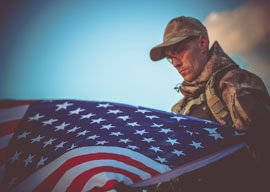
January 25, 2017

Source: Bigstock
Most of Junger’s descriptions of the merits of tribal life are drawn from American Indian lore rather than from Muslim Afghanistan, even though he has spent much time there embedded with the U.S. Army. In Restrepo, local tribal life looks small-minded and deadening. The go-getting American officer tries to arrange win-win deals with the villagers, but the henna-bearded elders refuse to consider them.
The Pathans of Afghanistan and Pakistan may not be fair representatives of barbarian mores, though. They are a bitterly individualist and cutthroat culture, with proverbs that tend toward the horrifying:
One’s own mother and sister are disgusting.
When the floodwaters reach your chin, put your son beneath your feet.
In Winston Churchill’s description of his enemies in a punitive raid in 1897, however, Pathan tribal life at least seems entertaining:
Every family cultivates its vendetta; every clan, its feud. The numerous tribes and combinations of tribes all have their accounts to settle with one another. Nothing is ever forgotten, and very few debts are left unpaid…. The life of the Pathan is thus full of interest…
Churchill’s observation raises the key conceptual problem that Junger doesn”t really have any solution for: scale. While Junger uses the term “tribalism” to connote solidarity, which he desires for America, it more conventionally implies divisiveness along clan lines.
Yet both suggestions are useful. For instance, part of the appeal of American Indian life was that tribe members had the options of not just loyalty or voice, but also of exit. Tribes frequently fractured when different factions couldn”t get along. Rather than stay together and stab each other in the back, one group would up and leave. This was easier to do during historical times, when Indian country wasn”t at its Malthusian limit of population because Old World diseases were reducing the population. Plus, Indians didn”t much mind dividing into warring tribes because they enjoyed war.
On the other hand, tribal fractiousness doomed the Indians to lose to the far more united Americans. Most of the famous Indians in history”such as Pontiac, Tecumseh, and Sitting Bull”were political geniuses who could somehow get a large number of braves to show up at one time on one battlefield to fight the whites. We honor their names today because this was so hard to do.
As Junger laments, Americans today seem more interested in reviling one another than in cooperating. Perhaps that’s not surprising: America is a huge country and, luckily, hasn”t had to come together much to win wars in recent generations.
Fortunately, we already have a system, bequeathed to us by the Founders, for how we can get along without getting in each other’s faces: federalism. It’s long been out of fashion, but we can live and let live as long as we don”t insist upon micromanaging the daily lives of other Americans in distant parts of the country.
The other requirement is that we have to forswear trying to defeat our fellow citizens by importing foreigners to vote for our party. That kind of election rigging is lethal to camaraderie.